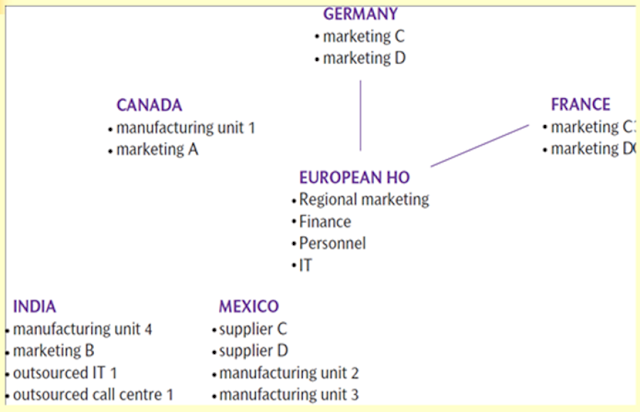Risks and Opportunities in Emerging Economies
The Business Model
1)
Customer
Value Proposition
n
Who are
your target customers?
n
What is
the problem or need you will help them with?
n
How will
you meet their needs?
2)
Key
Resources (needed to deliver the CVP)
3)
Key
Processes (Porter’s Value Chain activities)
4)
Profit
Formula (costs and revenues)
Managers look at how
these factors will vary
n
as the
SCALE of output rises
n
over
TIME – lead times, throughput, cash flows
n
over SPACE – do you need to adapt the
business model when you move beyond your home market?
(Johnson, M.W.,
Christensen, C.M. and Kagermann, H. (2008) Reinventing Your Business Model. Harvard
Business Review. 86/12 p: 50)
‘Established’ and ‘Emerging’ Multinationals (Ghemawat and Hout 2008)
n
Established
MNEs are world leaders, usually with
n
Home
bases in the developed countries of the traditional Triad (Western Europe,
USA/Canada, Japan)
n
High
global market share
n
Easy
access to capital and technology
n
Expertise
in cross-border co-ordination
n
Emerging
MNEs are vigorous challengers, usually with
n
Home
bases in emerging economies
n
Low
labour costs
n
Excellent
local knowledge of customers and distribution networks
n
The
Triad 17:
n
USA,
Canada; Japan; Denmark, Finland, Norway, Sweden, UK, Ireland, Germany, Austria,
Switzerland, France, Belgium, Holland, Italy, Spain
n
13% of
world population in 2003 and 2008; 74% of world Gross Domestic Product in 2003
and 62% in 2008
n
Accounted
for 70% of world exports in 1990 and 60% in 2003
n
The
Fast-Growing 18:
n
China,
Taiwan, South Korea; India; Indonesia, Malaysia, Singapore, Thailand; Brazil,
Mexico; Australia, South Africa, Saudi Arabia, Turkey; Czech Republic, Hungary,
Poland, Russian Federation
n
53% of
world population in 2003 and 2008; 17% of world GDP in 2003 and 26% in 2008
n
14% of
world exports in 1990 and 23% in 2003
The Economic Pyramid
(Prahalad, C.K. And Lieberthal, K. (1998) The End of Corporate Imperialism. Harvard Business Review, July)
(Prahalad, C.K. And Lieberthal, K. (1998) The End of Corporate Imperialism. Harvard Business Review, July)
At the Bottom of the Pyramid
n
Opportunities
exist to reach billions of customers (Prahalad and Hammond 2002)
n
Mobile
phones and microfinance can emancipate previously marginalised groups
n
Low-cost
operations give competitive advantage
n
Emerging
multinationals know how to create appropriate distribution networks
n
To
compete successfully, established multinationals need to use their best
managers and work with local allies
Some ‘Established MNEs’ now have most of their operations in emerging economies…
Global Chess:
Interactions between Established and Emerging MNEs
(Bartlett and Beamish 2014: Ch 3, pp. 219-222)
(Bartlett and Beamish 2014: Ch 3, pp. 219-222)
n
Emerging Challengers: moving rapidly from a
low-profile foothold position to build a strong international presence
n
Focus on developing strong competence in a narrow
niche
n
Careful expansion along both product and geographic
dimensions; step-by-step
n
Established Triad giants: developing a transnational strategy to defend worldwide dominance (Frynas
and Mellahi Ch 9; Lectures 6 and 7)
n
Reinforce existing and develop new assets and capabilities
– without damaging the old ones
n
Compensate for deficiency or approximate
competitor’s source of advantage
n
Domestic defenders: protecting established
niches
n
Lobby
for tariff protection or change industry standards
n
Copy
your competitors
Transnational Strategic Management
(Bartlett and Beamish Ch 7)
(Bartlett and Beamish Ch 7)
n
The
Entrepreneurial Process (geographic subsidiary and operating-level managers)
n
Creating
and pursuing local opportunities
n
Aligned
with leader’s strategic mission
n
Delivering
required returns
n
The
Integration Process (global business and senior-level functional managers)
n
Linking
and leveraging competencies
n
Sharing
information, ideas and resources
n
Building
an organizational identity
n
The
Renewal Process (top-level corporate management)
n
Questioning
current strategies through benchmarking and forecasting
n
Rationalisation
and restructuring
n
Envisioning
the next quantum leap
n
Transnational
in mentality, transformational in leadership style
Balancing Integration and Responsiveness through Learning
Other Challenges Facing Established MNEs
n
Understanding
new environments
n
Coping
with distance: CAGE framework
n
Overcoming
the liability of foreignness
n
Value of
local partners
n
Coping
with global uncertainties
n
Nationalism,
religious fundamentalism
n
Global
warming, consumer concerns about health
n
Rapid
social and political change outside the Triad
n
Managing
local-level risk
n
Exchange
rate fluctuations, taxation reforms
n
Warfare,
corruption, theft or confiscation of assets
Assessing and Managing Risk
n
Appoint
a Chief Risk Officer to nurture a culture of awareness (Cleary S. and Malleret
T. (2007) Global Risk. Palgrave Macmillan. Chapter 8)
n
Involve
all members of staff
n
Encourage
sharing of lessons from failure
n
Engage
in systematic monitoring and analysis of significant risk factors
n
Communicate
danger signals fast
Forestalling Crises
n
Build
partnerships for innovation and local responsiveness
n
Engage
with stakeholders to anticipate concerns
n
Be
willing to change your attitude
n
Reinvigorate
legitimacy with governments by aligning with development goals
Ethical Dilemmas
Bartlett et al (2014: Ch 8, pp 645-655): Four MNE
postures in the face of
n
Anti-globalization
protest movements
n
Global
poverty
1. The
Exploitative MNE
n
taking
advantage of disadvantage (sweatshops)
2. The
Transactional MNE
n
Doing
deals, respecting laws (do no harm)
3. The
Responsive MNE
n
Making a
difference (Hindustan Lever laundry bars)
4. The
Transformative MNE
n
Leading
broad change (Merck and river blindness)
Making Your Values Work (Phatak, Bhagat and Kashlak (2005) International Management. New York: McGraw-Hill. 534-537)
n
Be
committed – at top management level
n
Develop
a written code of conduct
n
Involve
divisional and subsidiary managers - establish committees (http://www.unitedplantations.com/Files/PDF/Announcements/UP%20Annual%20Report%202012%20(2).pdf
p. 46)
n
Ask line
managers to train employees
n
Fire
people who violate the code
n
Withdraw
from countries or industries where you cannot act with integrity



Hey, I just read out your blog, it's quite interesting and informative thank you for sharing it..personally, i like Catalyst for international business expansion strategy. They provide coaching and consultancy at affordable rates.
ReplyDelete